The third way
Mariusz Zabrocki explains how FreeNow is taking its own route to ride-hailing

The Sefton ruling –all change, or no change?


EDITORIAL DIRECTOR
Mark Bursa 07813 320044 markbursa@prodrivermags.com
COMMERCIAL DIRECTOR


Paul Webb 07807 133527 paulwebb@prodrivermags.com


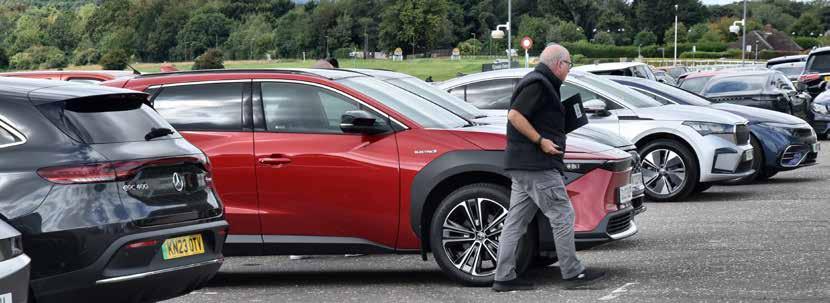
ART DIRECTOR
Alan Booth
CONTRIBUTORS
Ian Robertson, Glen Holder, Phil Rule, John Coombes, Phil Huff, Tim Barnes-Clay, Gary Jacobs, David Wilkins, Craig Thomas,
Kevin Willis, Peter Panayiotou, Mike Stone, Dennot Nyack, Dr Mike Galvin, Tim Scrafton WEBSITE Martin Coombes 01959 547000

COMPANY ADDRESS

50 Beechcroft Manor, Oatlands, Weybridge, KT13 9NZ
SUBSCRIBE Curwood CMS Ltd, The Barn, Abbey Mews, Robertsbridge, TN32 5AD 01580 883844 subs@prodrivermags.com
2 SEPTEMBER 2023 contents 24 COVER STORY The third way – how FreeNow is taking its own route to ride-hailing 4-10 Business News The latest from around the industry 11 Call for entries Don’t miss out on the 2023 Professional Driver QSi Awards 12 News analysis Will the Sefton judgement affect your business? 18 News analysis Sadiq Khan has expanded the ULEZ – but is it a done deal? 22 Judgement day A look back at last month’s Car of the Year event 27 Running report BMW i7 REGULARS 28 The Knowledge 29 The Advisor 30 The Negotiator 31 The Insider 18 15 22 SEPTEMBER 2023 12 ANALYSIS: litigation Allchange,ornochange? The Sefton ruling Unfortunately, that’s not always the dispute between Uber, the ACDU union and number of local operators finally delivered ruling in July, having started hearing submissions at the end of 2022. obvious conclusion that operators would be forced to charge VAT on fares. But a deeper dive into the denselyworded judgement reveals this is not necessarily the case. Experts in the law and nance claim that, far from clearing up the issue once and for all, nothing much has changed. What has been defined is this. A private hire customer’s contract is with the operator, not the driver. The judgement on this basic principle is clear, and the ruling supports an earlier similar decision relating to London. London private hire services are regulated by a different act of parliament to those outside the capital. In London, the Private Hire Vehicles (London) Act 1998 is the primary regulatory legislation, while elsewhere the Local Government (Miscellaneous Provisions) Act 1976 is still the governing rulebook. This is why Uber – having lost its Mark Bursa W a verdict, those affected would be forgiven for expecting some clarity as result. assertion that the contract was with the driver in London, now sought to clarify whether that was the case outside London. The London case had been brought by the ride-hailing drivers’ union, ACDU, against Uber, and as direct result of this ruling, Uber has reclassified its drivers as “workers”, offering them benefits such pension scheme. Having agreed to comply with the London ruling, Uber was indicating was prepared to do the same elsewhere – but by forcing a ruling, it would mean, in theory, that all other operators, not their drivers, were the “principal” in any customer contract. Uber effectively switched sides, teaming up with ACDU for the Sefton case, and gaining support from ride-hailing rival Bolt. The claim was opposed by major local operator Delta Cars and the UK’s largest traditional private hire operator Veezu, which argued that the contract was with the self-employed driver, with the operator merely acting as a facilitator. objections and ruled in favour of ACDU and Uber, arguing that the contract being with the operator was in the interests of public safety. Uber welcomed the judgement. spokesperson said: “Today’s judgment resolves a major inconsistency in the way hire operators across England and Wales. But while clarifies many key points, there remain questions on VAT and what passengers should pay.” Mrs Justice Foster accepted that the London ruling was directly relevant. “Given the similarities of context and statutory over directly to the present situation,” she said. She admitted that the ruling might make some opertators’ business models difficult to operate, stating that “certain types of had argued that the passenger’s contract was directly with the driver, not the operator The Se on ruling –all change, or no change? The third way Mariusz Zabrocki explains how FreeNow is taking its own route to ride-hailing
Registered in England No.: 7086172 © 2023 All contents copyright of ProDriver Media Ltd.
Courting controversy
IT SEEMS SOMETIMES THAT THE REGULATORY framework for the taxi and private hire sector is being written in the courtroom, rather than civil service back rooms.
Rightly or wrongly, trade unions and ride-hailing firms seem to be driving change, rather than government, whose attempts to bring about a framework for the industry once again seem to have been kicked into the long grass.
So we’re left with having to unpick the dense legalese used in the recent Sefton judgement, and trying to work out what it means for the taxi and private hire trade.
But don’t draw too many conclusions. Sefton in reality isn’t going to change anything. All it does is clarify that the customer’s relationship is with the operator, not the driver.
That’s actually a good thing. In court, two of the biggest operators in the UK, Delta Taxis and Veezu, argued that they were mere platforms and the passenger’s contract was directly with the driver.
The judge disagreed, and rightly so. When you use the Veezu app or call the Delta phone number, you’re not asking Ron or Mohammed or Julie or Wojtek to come and pick you up. You’re requesting a Delta car, or a Veezu car.
Uber has accepted this too, and as a result of further court cases has adjusted its whole business model, giving drivers “worker” status and paying VAT on the margin of each fare.
Does Sefton mean every operator will have to do this? Clearly not. The judge made it clear that imposing VAT was outside the scope of the case – you’ll have to wait for HMRC to come knocking for that.
And that issue is also likely to be cleared up in court as well. Both Bolt and Uber have pending cases over the payment of VAT on the margin only (which means the taxman gets a lot less money that the 20% he thinks should be charged on the whole fare).
Indeed, a ruling could come as early as this month, though as we’ve seen with Sefton, don’t hold your breath for an early judgement.
And even if HMRC were to win, adding 20% to every taxi fare in the country at a time of economic hardship would not be a popular decision, and the government is likely to step in at that point and either declare private hire journeys zerorated for VAT (which Delta is demanding), or subject to a lower flat rate, say 5% (which the likes of Uber and FreeNow are prepared to accept).
Either way, it looks unlikely that you’ll have to stick 20%
on the rate card to cover VAT at any time in the near future. Hopefully, common sense will prevail and a private hire trip will be seen for what it is – a transport fare, just like the ones you pay to travel on a train, or a tram, or a bus. All of which are zero rated for VAT.
That way the struggling families using taxis to go shopping, or the pensioner who needs a minicab to the hospital, are spared higher fares.
It’s only a shame that a similar approach – helping the vulnerable – has not been applied to the other court decision of recent weeks – the expansion of the London ULEZ into the leafy outer boroughs, where pollution is not the same issue it is in central London.
Sadly every right-wing blowhard in politics and the media has jumped on the anti-ULEZ bandwagon, Using it as a stick with which to beat London’s Labour mayor Sadiq Khan.
Let’s be clear here. Firstly, there is no question that in central London, ULEZ has had a positive impact on air quality. But never forget that ULEZ expansion was carried out at the behest of the Tory government as part of its Covid bailout of TfL, so for Conservatives to be blaming Khan for their own policy is a bit rich.
Khan has not helped himself by doubling down on wild claims about public health benefits, putting together an inadequate incentive programme for vehicle upgrades and manipulating consultation results to make the public reaction look less hostile.
In terms of health benefits versus electoral damage for Labour, the result is not good for Khan. With both London Mayoral elections and a General Election on the near horizon, it may be that Labour central steps in.
Either way, its another mess, and demonstrates how poorly the private hire trade has been treated by TfL over the years, regardless of the political colour of the incumbent mayor.
PHVs reduce congestion, and reduce pollution too, yet we’re seen as cash cows time and again. Let’s hope that somewhere down the line, this is recognised. It would be nice to get the Congestion Charge exemption back too, wouldn’t it.
Don’t hold your breath.
Mark Bursa Editor markbursa@prodrivermags.com
3 SEPTEMBER 2023 comment
Three Glasgow operators stripped of licenses after cars failed to meet LEZ requirements
Mark Bursa
Three Glasgow taxi operators have had their licenses revoked because their cars violated controversial low emissions zone regulations in the city, which came into force on June 1, 2023.

The companies’ vehicles did not meet the standards, the Council said. At a City Council committee meeting, they were told their licenses would not be returned until they comply with the new LEZ regulations. The firms - Unity Jackson, Cars 4U1 and J Mac Carsdid not attend the meeting.
The Scottish Private Hire Association has urged the council to take a “more sympathetic” approach to drivers struggling to meet the new requirements.

Eddie Grice, Secretary General of the SPHA, said: “The current approach to Glasgow licensing is frustrating. They are suspending the licenses of these operators until they can put a compliant vehicle on the road, but at the same time the council is denying them the ability to raise the necessary funds to do so.”
He told the committee that some drivers were facing difficulty in
complying with the LEZ. “We urge the authorities to do more to ease the transition. A more pragmatic and sympathetic approach is definitely needed here.”
Conservative committee member Cllr Thomas Kerr said the council had been “warned that their rash plans for an environmental zone would have a devastating impact on many working class Glasgowers. Yet they ignored it and moved on anyway. Unfortunately, the Licensing Committee’s hands are
Leeds Council to allow drivers to work for dual operators in new pilot scheme
Mark Bursa
Leeds taxi and private hire drivers will now be able to drive for two private hire operators, aligning Leeds with neighbouring authorities, as part of a new council pilot scheme.
The pilot scheme follows concerns raised by drivers that the current single operator model was creating an unjustifiable disparity in conditions with drivers licensed outside of
tied by Council leadership. It’s a shame.”
Last year Glasgow Council refused a request to push back by 12 months the start of enforcement of Glasgow’s Low Emissions Zone for taxis and private hire cars. Private cars will be allowed a further 12 months until June 2024, however.
The Scottish Private Hire Association had asked for the delay as it argued the LEZ would have a serious impact on the taxi trade. According to council figures, 26% of
the private hire fleet would require replacement by the enforcement date.
SPHA’s Grice said: “Retrofitting options are not available to the private hire trade. Only the hackney taxi has been given retrofit options. All private hire cars need to be replaced for compliant vehicles by the LEZ enforcement date.”
The LEZ will operate 24 hours a day, all year round. It will affect 226 streets throughout the city centre bounded by the M8 motorway to the north and west and the River Clyde to the south.
But unlike the London ULEZ, there is no option to pay a daily charge to enter the zone with a noncompliant car. Any non-compliant car that does not meet Euro 4 (petrol) or Euro 6 (diesel) emissions standards. Will simply be issued with a daily £60 fine, which drops to £30 if paid within two weeks.
However, the penalty doubles with each breach of the rules, up to a cap of £480 for cars and £960 for HGVs and buses. After 90 days have passed without the vehicle entering the zone, the charge is dropped again to £60.
Across Scotland just over a fifth of vehicles do not meet emissions standards.
allow the council to test out changes to policy relating to dual operators and provide a real boost to private hire drivers in Leeds during the cost-of-living crisis.
Leeds City Council’s deputy leader Cllr Debra Coupar said: “The dual operator pilot is a great opportunity for the council to test out a new approach and I hope the changes will give drivers licensed in Leeds a much-needed boost during the cost-of-living crisis.
The council is removing the requirement for cars to have windscreen livery and is considering options for displaying stickers for both operators on the sides of vehicles.
Leeds, who are able to drive in Leeds for more than one operator.
Running for up to 24 months, the pilot will
Following the pilot and a consultation, a final decision will be made in relation to permanently amending the relevant driver, operator and vehicle conditions to allow taxi and private hire drivers licensed within Leeds to drive for dual operators.
news SEPTEMBER 2023 4
Manchester removes private hire livery requirements after GMB campaign
Mark Bursa
Manchester City Council has removed its requirement for all private hire vehicles to display an operator’s name or company livery, following a GMB Union campaign.

The council’s Licensing Committee agreed to remove operators’ names and bonnet stickers, which will allow drivers to work for multiple operators rather than just one, bringing Manchester into line with London and many other cities. Manchester’s decision follows similar GMB wins over private hire livery in Southampton and Oldham.
The Manchester authority
also agreed to improve vehicle testing procedures and emissions legislation, as well as amend age
Northumberland taxi association slams council over licensing delays
 Mark Bursa
Mark Bursa
The Northumberland Taxi and Private Hire Association has criticised the local council for the time it takes to process licence applications.
NTPHA claimed there have been delays of up to eight weeks, meaning some drivers have suffered from a significant loss of earnings while they wait for their new licence.
A spokesman for the NTPHA said: “The council are currently running six to eight weeks behind with paperwork and taxi plates. One driver posted their paperwork in July and has still not received it back – it means we can’t work. Some drivers have been waiting up to ten weeks.”
The council has defended the licensing team. Cllr Gordon Stewart, cabinet member for communities, said: “We would refute any suggestion the taxi licensing department is understaffed and unorganised. There are currently five members in this team, not two, who have dealt with over 1,600 applications relating to taxi and private hire licensing over the last year.
limits, to assist drivers.
Habib Rehman, GMB lead representative, said:
“Manchester private hire drivers have been waiting for this change for a very long time. This move now means drivers will no longer need to display operator stickers, freeing them up to work for more than one operator.”
“They will no longer be driving around advertising operators for free or be restricted to working for one operator – as well as giving more passenger choice and speed of service too.”
Rehman concluded: “We at GMB Union welcome Manchester licensing department’s decision around signage on Private Hire Vehicles and Taxi and will continue working with them to bring about more positive changes.”
“Like many services, the department has busier periods throughout the year, and August is one of these times with additional applications relating to school transport.”
But the NPHTA spokesman said the explanation was inadequate. “What the council’s licensing department has said is to send them the email of
the insurance company and they will say that we have paid and are fully covered – but if there was something that went wrong, if a driver was in an accident and there was a fatality, where would their insurance stand? It is scary. The council need to get things in house sorted as a matter of urgency. Drivers are losing money hand over fist.”
news SEPTEMBER 2023 5
Apple Taxis could refuse to serve Exeter road trial as fares double, drivers abused
Mark Bursa
Apple Taxis, Exeter’s largest private hire company, has said it could stop serving a large area of Exeter where controversial road closures have recently been introduced.
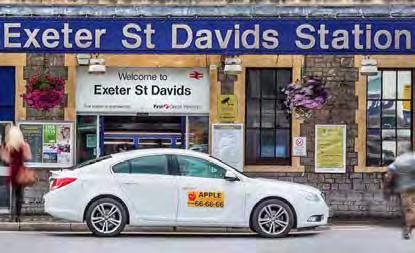
Since the scheme was introduced in Heavitree and Whipton on August 3, Apple Taxis general manager Graham Hockey said fares have significantly increased due to longer routes now having to be taken by drivers, who have also endured violence and abuse from some passengers.
Devon County Council has received a huge backlash of criticism following the implementation of a new lowtraffic neighbourhood (LTN) scheme in Heavitree and Whipton.
The scheme aims to create a safer and more attractive environment for people walking and cycling. All properties remain accessible by car but motorists, including taxis and private hire vehicles have to take alternative routes,.
Hockey said drivers were now reluctant to take on jobs in the area and that within the next month, the company will decide whether or not it can continue to serve residents in those areas, and if it will cut services completely to the “blacked-out area”.
He said: “We have not been consulted about any schemes and we are the only service that runs 24/7 throughout the city. We only found out about it literally two weeks ago when drivers living in the affected areas brought it to our attention.”
He added: “Since they have brought in the new gateways in Heavitree and Whipton, the majority of our fares there have doubled, if not tripled for passengers.”
“We are in a very difficult situation. Drivers are refusing to go in the affected areas as it’s adding two to three miles to their journey and since the scheme has come in we have been getting a large amount of customers doing runners when our taxis get to a bollard point.”
“They are saying that as drivers have not taken them to their address they haven’t fulfilled their duty and won’t pay. We have also had violence towards our drivers as they just assume the drivers are being awkward or they don’t want to pay the extra fare. We are piggy in the middle.”
Hockey concluded: “For the safety of our drivers and a lack of access to the area, we are potentially looking at drawing a large area entirely away from the new restrictions and not offering a private hire service to that area. It is not a decision we want to make but if we have no access and drivers are being put at risk, we can’t knowingly carry on the way we are on a daily basis.
“We will be making a decision in the
next two to four weeks. We are able to restrict service to an area if it is not feasible or safe. The scheme is said to be good for the environment but it’s forcing more traffic onto two roads that are already excessively busy. It just doesn’t make sense. The city is turning into a sorry state.”
The proposed trial has been put in place using Experimental Traffic Regulation Orders (ETROs). ETROs allow change to traffic regulations to be introduced on a temporary basis for up to 18 months so that their impacts can be better understood before deciding whether to make the changes permanent.
A Devon County Council spokesperson said: “Buses, emergency vehicles, local authority service vehicles, such as refuse collection lorries, pedestrians and cycles are permitted to pass through the bus gates within the Heavitree and Whipton Active Streets trial, but taxis and private hire vehicles are not.”
“As the trial has only been in place since August 3, it is too early to make any changes to the scheme. However, in conjunction with Exeter City Council, the licensing authority for Exeter, Devon County Council plans to engage with taxi and private hire operators during the trial in order to receive their feedback on the scheme.”
New study disputes effectiveness of Birmingham clean air zone
A new study by the University of Birmingham has disputed claims about the effectiveness of the Birmingham Clean Air Zone.
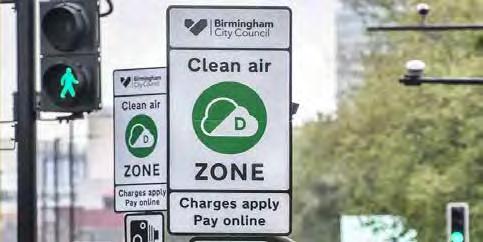
In particular, the study said Birmingham City Council’s claim that the CAZ has reduced air pollution by 13% was overstated, and the actual figure was closer to 7%.
The study said that while NOx pollution was reduced, PM2.5 particulate concentrations remained unchanged, though they were still above World Health Organisation guidelines.
The researchers argued that calculating the drop in pollution was complex and needed to consider weather and seasonal effects. The reductions in pollution were primarily observed in busy roadside locations within the zone, with some spillover effects outside the CAZ.
—Mark Bursa
news SEPTEMBER 2023 6 news

CCTV chaos as councils disagree over mandatory in-cab cameras
Mark Bursa
The need for national standards for taxis and private hire vehicles has been highlighted by the different approaches taken by local authorities to mandatory in-cab CCTV.
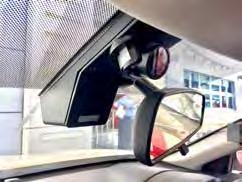
Some councils are mandating the systems in response to assaults on drivers, while others are refusing, claiming the systems are “disproportionate”.
Fareham Borough Council is to review its previous decision not to approve a blanket requirement for incab CCTV cameras after a driver in Southampton was convicted for sexually assaulting a passenger. CCTV cameras are mandatory in Southampton and evidence on the recording was used to secure the conviction.
The decision to reject the requirement for all taxis and PHVs to be fitted with CCTV, was influenced by relatively low complaint levels and financial challenges faced by drivers due to the pandemic.
A 2022 consultation involving 77 members of the licensed trade revealed that around 68% did not favour mandatory CCTV, mainly due to cost concerns. But a separate survey involving 95 members of the public found that four individuals had experienced crime while in a taxi.
The survey found that 74% of respondents said that they would feel safer in taxis equipped with CCTV, with 61% supporting mandatory installation.
As a result, Donna Jones, the Police and Crime Commissioner for Hampshire and the Isle of Wight is now call for all licensing authorities across Hampshire to introduce mandatory CCTV in taxis and private hire vehicles.
“This call was made following the conviction of a taxi driver in Southampton in May 2023 for a serious sexual assault to a passenger in his taxi. The police
found footage on the mandatory CCTV in the taxi which led to the conviction without the need for the victim to suffer the ordeal of a trial.”
The proposal suggests that newly plated taxis should be equipped with CCTV, while existing vehicles would have until April 25, 2025, to comply with the requirement.
Meanwhile taxi drivers in East Cambridgeshire will not be required to install CCTV in their cars. East Cambridgeshire District Council has decided there is not enough evidence to support making CCTV mandatory for the taxis licensed in the area.
A recent consultation only received 35 responses, though the council concluded that the “overwhelming response” from taxi drivers was that they currently felt safe at work, with only 20% indicating they would support mandatory CCTV.
The majority of the members of the public who responded to the consultation said they currently felt safe using taxis, but four people did say they may use taxis more if mandatory CCTV was introduced.
Witcham Parish Council also wrote to the district council to say it thought mandatory CCTV in taxis would be “beneficial”.
The Licensed Private Hire Car Association said it was not anti CCTV, but was against the “blanket mandating” of its use, raising concerns about the cost to drivers of buying and installing the CCTV, estimated at around £500 per car, as well as raising concerns over data management and privacy. LPHA said some drivers had indicated that mandating CCTV was a “burden they could not survive” and could lead to drivers leaving the trade.
Officers told councillors at a meeting of the East Cambridgeshire council’s licensing committee that the licensed drivers were “very professional and very compliant” and said there were few issues raised with the authority because of this. They added that due to the “lack of evidence of an overwhelming underlying issue”, they suggested mandatory CCTV would be “disproportionate” and should not go ahead.
Meanwhile Swindon Council has delayed its separate plan to roll out in-cab CCTV for both taxis and PHVs. The scheme, which has been under discussion since 2019, was due to start on January 1, 2024, for new licence applications and April next year for renewed licences.
But the council’s head of regulatory services, Kate Bishop told the committee that staff shortages had put the work on the back burner: “Within the past 10 months a number of licensing officers and the licensing manager have left the borough council. This has meant that the progress expected has not been made as the resources and expertise have not been available. As a result, the timeline and work requirement are currently being reviewed.”
Chairman on the committee Cllr John Ballman said: “We’ll let this go back on the agenda for the September meeting and we’ll see where we are then. Hopefully it will be sorted.”
Hyndburn plans licence changes for older taxis and private hire vehicles
Mark Bursa
Lancashire council is planning to introduce revised licensing for older taxis and private hire vehicles.
Hyndburn Borough Council is looking at reducing the frequency of roadworthiness tests for vehicles aged between 10 and 15 years old, and removing the mandatory requirement for vehicles to carry a fire extinguisher and first aid kit.
Currently all vehicles over 10 years old have to be tested three times a year and are only issued with a licence for four months,
excluding hybrids. If a vehicle over the age of 10 passes its test the first time on three consecutive occasions it will be issued with a six-month licence on the third occasion.

But the council is now proposing
that all vehicles between the age of 2 and 15 years to be granted a six-month licence regardless of whether they are hybrid or not.
“Once a vehicle reaches the age of 15 years it will revert to three
tests a year and be issued with a four-month licence,” said a council spokesperson.
The requirement to carry a first aid kit and a fire extinguisher was not necessary, as fire authority advice is to leave the vehicle and move away from it rather than tackling an engine blaze with a fire extinguisher. And only a trained first aider is permitted to administer first aid so a condition which requires the driver to carry a first aid kit “would appear to be unreasonable”, the spokesperson added.
news SEPTEMBER 2023 8 news
Be.EV to open 60 dedicated taxi and PHV charge points in Greater Manchester
Mark Bursa
Charge point operator Be.EV has announced it will install 60 rapid charging points across Greater Manchester exclusively dedicated to EV private hire and hackney vehicles licensed by one of the ten Greater Manchester Authorities.
The initiative has been made funded through a £5.9 million grant from the Government, and a number of sites are already operational, with others to follow in coming months:
u Foundry Street Car Park –
Bury Town Centre
u Thurloe Street Car Park –Rusholme, Manchester
u High Street Car Park –Rochdale Town Centre
u Hankinson Way Car Park –Pendleton, Salford
u Church Street Car Park –Swinton, Salford
u Lomas Street Car Park –Edgeley, Stockport
u Torkington Park Car Park –
Hazel Grove, Stockport
The Be.EV taxi chargers offer discounted rates of 72p/.kW against the regular 82p/kW public charge.
Be EV has also opened a major new EV charging hub capable of handling 400 cars a day in Greater Manchester.
The Sale Water Park hub, just two minutes from the M60 Motorway to the west of the city centre, is the largest ultra-rapid EV charging hub in Greater Manchester.
The state-of-the-art charging hub has been built at a cost of £1million by EV charging network Be.EV as part of a wider collaboration with Trafford Borough Council, which has already
Durham County Council launches low-cost kerbside EV charging pilot scheme
Mark Bursa
Durham County Council has launched a pilot scheme that will help people without driveways recharge electric cars outside their homes.
Thirty properties without off-street parking in the village of Crook have been chosen by the county council to take part. The scheme is run by Kerbo Charge. The installations run power from house to kerb via a cable channel into the pavement, which is covered with a flap to avoid being a trip hazard.
Cllr John Shuttleworth, the authority’s cabinet member for highways, rural communities and community safety, said the scheme would make owning an electric vehicle accessible to more people in the county.
seen more than 40 chargers go live across the region.
The Sale Water Park hub also has 16 ultra-rapid charger bays, which are capable of charging cars from 20% to 80% in as little as 20 minutes. The site offers a total of 1.2MW of power and is equipped with cuttingedge Kempower chargers that feature load balancing capabilities. This allows them to distribute energy supply intelligently between vehicles according to capacity and demand, so if one car reaches the maximum amount of power on one charger, any residual energy supply can be reassigned to
another vehicle connected on-site.
Sale Water Sports Centre has café and restaurant facilities which drivers can use while waiting for their vehicles to charge.
In a further development, Manchester City Council a Be.EV plan to transform a former petrol station site on the corner of Reliance Street and Oldham Road into a largescale EV charging ‘Oasis’ (pictured).

The site will include commercial space for local businesses and provide ultra-rapid charging for 16 electric vehicles, including accessible and van-suitable spaces, as well as secure charging for electric bicycles.
Be.EV’s public charging network is the largest across the northwest. The network boasts an impressive operational availability rate of 99.6%. Be.EV is working to install 1,000 further charge points across the North of England and beyond by 2024.
“We decided to be involved in the pilot after residents without driveways got in touch with us about seeking a solution to charge their electric vehicles,” he said. “Their properties were checked for suitability before a programme of installation was planned and a contribution towards the install was agreed.”
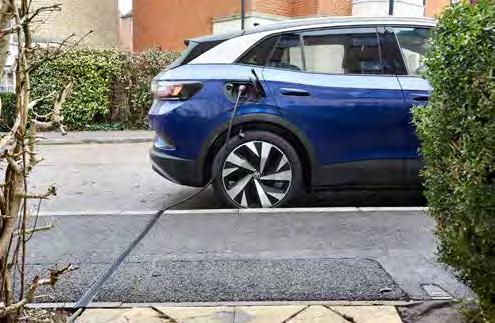
The council said the pilot marked the first time
Kerbo Charge had been trialled in the North East. If it proves effective, the scheme would be offered to all residents with a suitable property and people would then be given the option to pay towards installation.
The pilot will run for nine months. Milton Keynes Council launched a trial of the same product earlier this year.
news SEPTEMBER 2023 9
Newcastle Council approves black and white taxi revamp despite driver protests
Mark Bursa
Plans to rebrand Newcastle’s taxis into the blackand-white colours of Newcastle United Football Club have been approved by the city council, despite opposition from local drivers
Newcastle’s fleet of almost 600 licensed hackney carriages will be required to be all black with distinctive white bonnets. The vehicles will also need to display red City Council crests on the front doors and have a taxi sign on the roof that is white at the front and red at the rear.

The plans will also require private hire vehicles to display a green council number plate and the operator’s details on the rear passenger doors.
The new measures, part of the Council’s new Hackney Carriage and Private Hire Licensing Policy, were approved at a City Council meeting on September 6.
Earlier in the year, around 40 drivers unhappy about the revamp had protested outside Newcastle Civic Centre.
Mohammed Subhan, secretary of the Newcastle British-Bangladeshi Taxi Drivers’ Association, said: “It is a huge burden on the drivers and it does not make any sense. At night time you won’t be able to tell if a car has a black or white bonnet.”
However, drivers believe they will be forced to pay out regularly to have them replaced. Subhan said: “We drive these cars miles and miles. A white bonnet is going to get dirty very quickly, the wrap
Bolt launches ‘pet’ category to offer clarity to London pet owners
Ride-hailing operator Bolt has launched a dedicated Pet category in London, with a supplementary charge for passengers wishing to bring animals with them on their journeys.

Deborah Meijer, Head of Operations for Bolt in London said: “The category implements a level of transparency which will be appreciated by both sides and make for a more valuable, stressfree relationship.”
will get ripped and it will lose its elasticity.”
Subhan said a report to the council’s cabinet said 96% of drivers surveyed about the changes were against the proposal. He added that improved CCTV at taxi ranks would be a better use of money.
Cllr Paula Maines, Newcastle City Council Cabinet member for a Resilient City, said it was “crucial” to have a distinctive fleet of hackney carriage and private hire vehicles.
She said: “The unique branding will assure passengers that the driver, vehicle and operators have met our very high licensing standards and that they will be transported to their destination safely. It also supports the work we do with key
partners to stop unlicensed drivers illegally plying for trade and preying on vulnerable people –particularly lone women – after a night out.”
To support hackney carriage drivers with the new requirements, the Council will provide a £100 grant so they can get the white vinyl wrap fitted to the bonnet of their vehicle – a total cost of £60,000.
To qualify for the payment, the car should have been licensed with the Council on or before Monday, June 19 this year. The new policy also includes a requirement for any new vehicles to be compliant with the environmental standards of Newcastle and Gateshead’s Clean Air Zone.
who remain in the category will be able to see if a passenger is requesting a ‘Pet’ category ride and will be free to accept, decline, or ignore the request as they wish.
their person.
Consumer research indicates the category should bring a peace of mind to multiple use cases.
The additional charge represents an opportunity for drivers to increase their earnings.
Bolt has 6 million passengers signed up in London. Those with an assistance dog do not need to request the ‘Pet’ category.
Signing up to the category is not mandatory for drivers, who can opt out by unticking it in the Bolt Driver app. Furthermore, drivers
Bolt is taking efforts to educate the driver and passenger communities on the ins-and-outs of the category. If there’s only one passenger, they may bring two small pets. These include small to medium-sized dogs, cats, and other commonly recognised household pets.
In order to share the details of the category with drivers and passengers, the company is initiating a variety of communications including emails, blog posts, content and advertising on social media, and in-app pushes. Passengers are recommended to have a blanket on
Bolt data says 14% of Londoners are cat owners while 9% are dog owners.
Deborah Meijer, head of operations for Bolt in London said: “Many Londoners sometimes they can be reluctant to book a trip when they have their furry friend in tow as they don’t want to be a hassle. Similarly, drivers can be surprised when they find out it isn’t just humans that have requested a ride. The ‘Pet’ category gives transparency to both sides so should consequently make for a more valuable, stressfree relationship for all involved.”
—Mark Bursa
news SEPTEMBER 2023 10
QSI IS 10!
Enter now for the 10th Anniversary Professional Driver QSi Awards, and make sure you’re at a special celebration of all that’s great about the private hire, taxi and chauffeur industry.
Entries are now open across all 10 QSi Categories. You can enter yourself, or nominate companies or individuals who you think are deserving of the industry’s ultimate accolade – a gold, ,silver or bronze QSi Award.

Private Hire Operator, 1-80 cars


Private Hire Operator, 81+ cars
New-Start Operator Award
Community Award
Marketing Award
Environmental Award
Chauffeur Operator, 1-10 cars
Chauffeur Operator, 10+ cars
Business Diversification Award
Professional Driver of the Year ~~~~~~~






To enter, please click:
www.prodrivermags.com/qsiawards-home/qsi-enter/

To book your place, please click:
www.prodrivermags.com/qsiawards-home/buy-tickets/
Our famous awards ceremony will take place on Thursday, November 16, 2023 at a new venue, the Hilton Metropole Hotel, Brighton. It’s the best party in town, so don’t miss out!



~~~~~~~
2023
All change, or no change?
The Sefton ruling
Mark Bursa
Unfortunately, that’s not always the case. The long-running Sefton Council dispute between Uber, the ACDU union and a number of local operators finally delivered a ruling in July, having started hearing submissions at the end of 2022.
The immediate reaction was to draw the obvious conclusion – that operators would be forced to charge VAT on fares.
But a deeper dive into the denselyworded judgement reveals this is not necessarily the case. Experts in the law and finance claim that, far from clearing up the issue once and for all, nothing much has changed.
What has been defined is this. A private hire customer’s contract is with the operator, not the driver. The judgement on this basic principle is clear, and the ruling supports an earlier similar decision relating to London.
London private hire services are regulated by a different act of parliament to those outside the capital. In London, the Private Hire Vehicles (London) Act 1998 is the primary regulatory legislation, while elsewhere the Local Government (Miscellaneous Provisions) Act 1976 is still the governing rulebook.
This is why Uber – having lost its
Local operator Delta had argued that the passenger’s contract was directly with the driver, not the operator
assertion that the contract was with the driver in London, now sought to clarify whether that was the case outside London.
The London case had been brought by the ride-hailing drivers’ union, ACDU, against Uber, and as a direct result of this ruling, Uber has reclassified its drivers as “workers”, offering them benefits such as holiday and sick pay, and access to a pension scheme.
Having agreed to comply with the London ruling, Uber was indicating it was prepared to do the same elsewhere – but by forcing a ruling, it would mean, in theory, that all other operators, not their drivers, were the “principal” in any customer contract.
Uber effectively switched sides, teaming up with ACDU for the Sefton case, and gaining support from ride-hailing rival Bolt. The claim was opposed by major local operator Delta Cars and the UK’s largest traditional private hire operator Veezu, which argued that the contract was with the self-employed driver, with the operator merely acting as a facilitator.
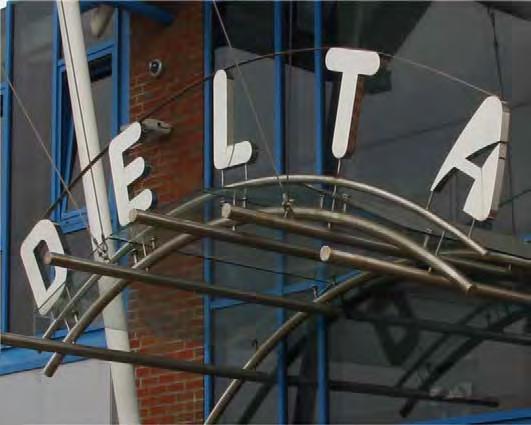
Mrs Justice Foster DBE rejected these objections and ruled in favour of ACDU and Uber, arguing that the contract being with the operator was in the interests of public safety.
Uber welcomed the judgement. A spokesperson said: “Today’s judgment resolves a major inconsistency in the way that rules have been applied for private hire operators across England and Wales. But while it clarifies many key points, there remain questions on VAT and what passengers should pay.”
Mrs Justice Foster accepted that the London ruling was directly relevant. “Given the similarities of context and statutory intention between the two Acts…the findings of the [London] case must read over directly to the present situation,” she said.
She admitted that the ruling might make some opertators’ business models difficult to operate, stating that “certain types of
CONTINUED ON PAGE
SEPTEMBER 2023 12 analysis: litigation
When a court case takes many months to reach a verdict, those affected would be forgiven for expecting some clarity as a result.
14

analysis: litigation
“What has been defined is this. A private hire customer’s contract is with the operator, not the driver. The judgement on this basic principle is clear, and the ruling supports an earlier similar decision relating to London....”
service model” might be “no longer capable of operation under the statute.” However, no indicatrion was given as to how this might be regulated.
Perhaps more importantly, Mrs Justice Foster dismissed the operators’ arguments that it would lead to fare rises, stating: “The VAT consequences for those who will wish to change their operating model are in my judgement irrelevant.”
She added: “Nor indeed… is it wholly impossible that any consequent change by way of increase to fares because of an element of taxation would necessarily be passed on to the customer.”
The comments are significant, believes Eazitax’s Gary Jacobs. “The judge’s ruling explicitly stated that the VAT consequences of changing the operating model were irrelevant to the case,” he said. “This meant that the court’s decision did not hinge on potential changes to the VAT obligations of ride-sharing platforms.”
“This legal victory for Uber emphasised that the case was primarily concerned with whether Uber and others, are indeed private hire operators, not tax implications,” he added.
Uber, the company at the centre of the case, agreed. Spokesman Matt Keirdle said: “If there are VAT implications, it is not the court’s concern.”

Jacobs believes it is not within the power of regulators to force operators to pay VAT. “Our view is that only HMRC in individual cases or national Government legislation can change the VAT environment, not regulators. So, for the time being carry on with your existing VAT model,” he said.
Jacobs urged operators to have a well thought out and defendable VAT model. “I’m also not saying private hire will not be under further scrutiny in the future, but even after the Sefton case, please do not rush to change anything. A tech company’s ride hailing platform is not the traditional PH model. Let’s see what our government has in store for us first.”
As for the ruling, I feel that PH Operators have always acknowledged at least a ‘duty of care’ of the passenger, so the move to principal isn’t such a big jump. However, it is an interesting use of the word ‘principal’ and could be conceived as an attempt to imply tax obligations. There were other words that could have been used such as “primary” or “main” to avoid the confusion. Jacobs added: “Only time will tell.”
Private hire operators have traditionally
Whose customer?
The High Court ruled that the operator is responsible, not the self-emploeyed driver
been able to avoid charging VAT by insisting that the contract is with the driver. As the drivers do not earn more than the VAT threshold of £85,000, VAT does not have to be charged.
The Sefton ruling was strongly influenced by the outcome of a court case that the ACDU brought against Uber in London, which also ruled that the customer’s contract was with the operator. Uber has since fallen in line, reclassifying its drivers as “workers” and offering them benefits such as holiday and sick pay, and access to a pension scheme.
Uber had managed to sidestep VAT by operating through a Netherlands-registered holding company, Uber BV, but since the December 2021 London ruling it has been
charging VAT on fares in London, though not at 20% on the gross, rather on its own margin, arguing that the non-VAT-registered drivers should not have to pay VAT on their portion of the fare. Uber last year made provision of £615m in its accounts to cover back-dated VAT payments.
Uber’s Matt Keirdle explained that Uber used a provision known as VAT Article 197 to pay VAT only on its margin. “If a company buys in a third party (a driver) and sells on the service they qualify to apply VAT on the margin not the whole fare.” This is also employed by Bolt and FreeNow, Uber’s main competitors in the ride-hailing market.
The margin scheme effectively means VAT is only charged (at 20%) on Uber’s commission (usually 15%), so the VAT element equates to roughly 3% of the fare charged. No VAT is paid on the driver’s earnings.
However, Keirdle said the margin scheme was not clear cut. “HMRC disagrees, but doesn’t say what it proposes instead.”
Indeed, HMRC has “disputed the amount and manner” in which Uber had applied VAT to its UK mobility business, and claims the company owed an additional £386m in VAT. Uber plans to appeal against the decision at a UK tax tribunal, and has made further provision for the amount
SEPTEMBER 2023 14
analysis: litigation
CONTINUED FROM PAGE 12
“The Sefton ruling was strongly influenced by the outcome of a court case that the ACDU brought against Uber in London, which also ruled that the customer’s contract was with the operator...”
in its recent half-yearly accounts.
No date has been set for this hearing, but on September 23, a tax tribunal involving Uber rival Bolt over the VAT margin scheme will be held. This “should get clarity for everyone on this issue”, Keirdle believes. Alternatively, the Government might step in in order to stop ongoing litigation over the VAT issue and impose either a blanket rate – say 5% – or a zero rate on all private hire journeys, bringing them into line with bus and train fares.
The Government is monitoring the situation, and in a response to a parliamentary question, minister Lucy Frazer confirmed that HMRC was examining the Sefton ruling.
Layla Barke-Jones, a lawyer representing Delta Taxis, one of the firms on the losing side in the Sefton case, is planning to lobby for a zero rate. Barke-Jones she was disappointed with the outcome: “Without a doubt, the case has the potential to cause significantly increased costs that will hit passengers everywhere at the time of a cost of living crisis.”
She added: “Delta had hoped to protect passengers from such an impact, and will now call on Government to make private hire taxi journeys zero-rated for tax purposes, in line with other forms of transport like buses and trains, to prevent this impact on some of the most vulnerable in society for whom private hire taxis can be the only form of transport available to them.”
She concluded: “We are disappointed at the outcome and are taking time to consider and reflect upon the judgment. We respect the judge’s findings but are considering the impact with our client including whether to appeal.”
The Sefton case may not have resolved the issue of VAT, but it has given operators a set of guidelines over how they should build their relationships with drivers and customers.
Neil Morley, of law firm Travis Morley, said every operator should consider whether it can satisfy the obligation to be the “principal” in the customer relationship.
“To do so, it will need to be capable of clearly demonstrating entrance, upon acceptance of a booking, into a clear contractual relationship with passengers to provide journeys,” he said. “A key starting point will be to review existing passenger terms and driver contracts. Ultimately, at this stage, compliance will be a subjective question to be considered, and addressed, by each individual business.”
The ruling in detail
Neil Morley of Travis Morley explains the densely-worded Sefton judgement
On July 28, 2023 the High Court handed down its decision in the case of Uber Britannia Limited v Sefton Metropolitan Borough Council & Others [2023] EWHC 1975 (KB).
It had been tasked with hearing a claim, brought by Uber Britannia Limited (“Uber”) for clarification on contractual relationships under the Local Government (Miscellaneous Provisions) Act 1976. Uber raised, as outlined in the judgement, the question:
“In order to operate lawfully under Part II Local Government (Miscellaneous Provisions) Act 1976, is a licensed operator that accepts a booking from a passenger required to enter as principal into a contractual obligation with the passenger to provide the journey which is the subject of the booking?”
Effectively, it asks whether or not contractual relationships between operators, drivers and passengers are governed by the statute. The answer to which could have implications for judicial observations, regarding worker rights, by the Supreme Court (Uber BV v Aslam & Others, 2021).
A prior High Court judgement, initiated by Uber London Limited, found the Private Hire Vehicles (London) Act 1998 does govern so in London (Uber London Limited v Transport for London, 2021). Consequently, Uber now sought to clarify the position, under similar legislation, outside London.
In these proceedings, Uber asserted the answer to the question must be “yes” and was supported, as intervenors, by Bolt Services UK Limited (“Bolt”) and the App Drivers & Couriers Union (“ADCU”).
Veezu Holdings Limited (“Veezu”) and DELTA Merseyside Limited (“Delta”), also intervenors, asserted the answer was “no”. Sefton Metropolitan Borough Council (“Sefton”) remained neutral.
Finding in favour of Uber’s view, Mrs Justice Foster DBE ruled: “…the question posed is to be answered “yes”…”
It followed therefore, in the opinion of the court, that “…inviting and accepting a booking inevitably in my judgement connote the formation of a contract with the passenger....”
The court referenced, in coming to its conclusion, the construction of the statute and, in particular, the wording of certain key provisions. Comparisons were notably made to the precedent set for London.
“Given the similarities of context and statutory intention between the two Acts…the findings of the London case must read over directly to the present situation.”
Additional consideration was applied to interlinking matters of operating models, market competition and, foremost, public safety. The issue of VAT was dismissed as “irrelevant”.
Such an interpretation now means licensing authorities, as Transport for London has in London, should ascertain whether private hire operators lawfully comply with this requirement. While the court notes its decision will render “certain types of service model …no longer capable of operation under the statute”, it is unclear how the task of assessing licence holder compliance is to be administered or enforced. The approach adopted by TfL may, as yet, prove a starting point.
If you want to check how you are affected by this decision, please contact Travis Morley Law at enquiries@travismorley.com
SEPTEMBER 2023 15 analysis: litigation
INCREMENTAL TRIPS
Are you the next Local Cab Operator?

• Receive more work - especially during quiet times
• Additional revenue opportunities for your drivers



• Join 150+ operators across 100+ cities


• Grow your fleet
TESTIMONIALS

The driver shortages have been really difficult, but we’ve actually had a lot of new drivers approach us who want to work for us and increase their earnings.
Amir Khan Manager 001 Taxis
The fact that Local Cab only uses drivers when they’re clear is a godsend. It’s been a struggle so it’s just handy that they have these jobs when it’s a little quieter.
David Sherwood General Manager Amber Cars

Local Cab is going better than I expected. It was straight forward getting it switched on and we’ve started to notice the extra bookings pick up.
Nomaan Hussain Owner Jet Taxis










sales@autocab.com www.autocab.com Live Operators In Pipeline for 2023
Rising anger as London Mayor Khan follows through on ULEZ expansion despite the issue arguably costing Labour victory in the Uxbridge by-election
The ULEZ effect
Mark Bursa
LONDON MAYOR SADIQ KHAN’S CONTROVERSIAL EXPANSION
of the Ultra-Low Emissions
The move means drivers of cars that do not meet Euro 4 petrol or Euro 6 diesel emissions standards now have to pay a £12.50 charge to enter an expanded zone that stretches as far, in places, as the M25.
The plan has proved to be immensely unpopular and has polarised opinions. It was the principal reason that Labour failed to win the Uxbridge by-election in July, when it appeared likely that the seat, vacated by Boris Johnson, was set to swing from blue to red. Defeated Labour candidate Danny Beales said ULEZ expansion had “cut us off at the knees”.
The by-election took place just days before the High Court ruled that the expansion was legal, in a case against Mayor Khan brought by a number of local authorities opposed to the scheme.
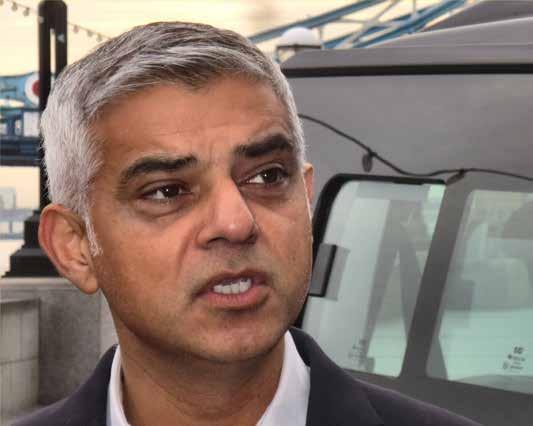
The coalition of councils, including Bromley, Bexley, Harrow and Hillingdon Councils, expressed their disappointment at the ruling. “It is evident that the Mayor of London and TfL do not realise the damage the extension will have to the lives of residents and businesses in outer London as well as those outside of its borders,” the councils said in a statement.
Mayor Khan takes to the social media platforms almost hourly to trot out the same message about air quality improvements. Yet these improvements are not supported by the science – including TfL’s own research.
While Khan states – somewhat questionably - that the overall effect of the ULEZ across London as a while has been positive in terms of air quality, it is clear that the impact in the outer boroughs is so negligible as to be imperceptible.
TfL commissioned a report by Jacobs UK into the impact of ULEZ expansion. This document, published in 2022, modelled the effect of ULEZ expansion into outer boroughs in terms of NOx and particulate emissions. It concluded that NOx levels would fall just 1% across all outer London boroughs, while PM25 particle emissions would not be reduced at all.
Indeed, the report suggested that with the ULEZ expansion, a 1.3% fall in NOx emissions would occur in outer boroughs between 2022 and 2023, while if it was not introduced, NOx emissions would fall 0.3% anyway due to the introduction of cleaner vehicles through natural replacement cycles. The only upside of ULEZ expansion would be a small increase in the proportion of major roads which will achieve the World Health Organisation NO2 Interim Targets of 20 and 30 μg/m3, respectively, with 4.6% of roads in outer London meeting the lowest WHO NO2 Interim Target. Hardly the public heath breakthrough that Khan claims.
Earlier claims by the Mayor that ULEZ had cut pollution levels by 29% were questioned by researchers at London’s Imperial College, whose analysis of roadside emissions data collected by TfL concluded that the drop was just 3% in NOx terms, and negligible in PM25 terms. Imperial College researchers concluded: “The Ulez on its own is not an effective strategy in the sense that the marginal causal effects were small.”
Anger about the expansion does not look to be dissipating, and the beleaguered Conservative government, buoyed by its CONTINUED
SEPTEMBER 2023 18 analysis: ulez
Zone into London’s outer boroughs has survived legal challenges and protests, and came into force on Monday, August 29.
ON PAGE 19
success in Uxbridge, is using ULEZ as a stick to beat the Labour party with. The most extreme manifestation has been former Tory party leader Iain Duncan Smith praising vandals who have been damaging or destroying ULEZ cameras, saying: “I am happy for them to do it because they are facing an imposition that no-one wants and they have been lied to about it.”
The irony of this situation is twofold. The initial central London ULEZ scheme was introduced in 2015 by Boris Johnson when he was London Mayor (Johnson is now of course a critic of his successor’s ULEZ expansion).
And Khan has introduced the expansion not solely out of concern for the environment and the health of Londoners: he was told to do it by the government as a condition of the Covid-19 bailout of Transport for London in 2020.
With lockdown shutting off much of TfL’s revenue in terms of bus and tube fares, a £1.6 billion bailout was offered in May 2020. However, in a memo from Transport Secretary Grant Shapps to the Mayor dated May 14, 2020, Khan was instructed to reinstate C-Charge, LEZ and ULEZ charges, “and urgently bring forward proposals to widen the scope and levels of these charges”.
But rather than refer to the expansion as an imposition by Central Government, Khan has doubled down on the public health aspects, claiming that 4,000 people die
each year as a result of vehicular emissions poisoning. This claim is not made in any of TfL’s specific research; rather it is based on estimates of deaths caused by all forms of air pollution across London, of which vehicular pollution is only a part.
While the ULEZ expansion has now gone ahead, it is clear that the battle is not
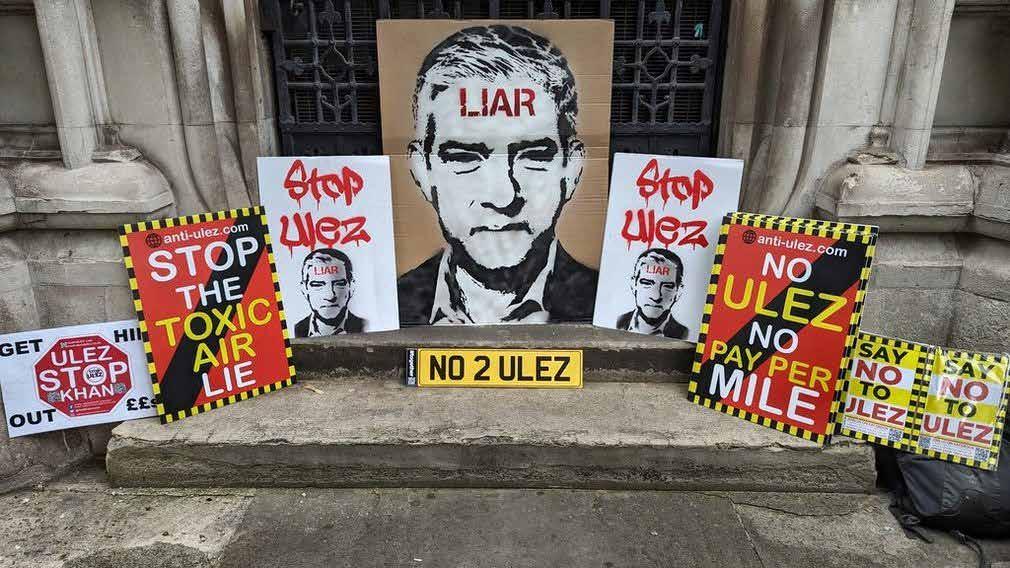
over. The councils that challenged ULEZ expansion in the High Court are refusing to allow TfL contractors to erect ULEZ cameras on roads in their areas. TfL claimed at the end of July that two-thirds (1,775) of the 2,750 enforcement cameras it planned to install had been erected, but there was widespread vandalism, with more than 600 of the devices damaged or destroyed.
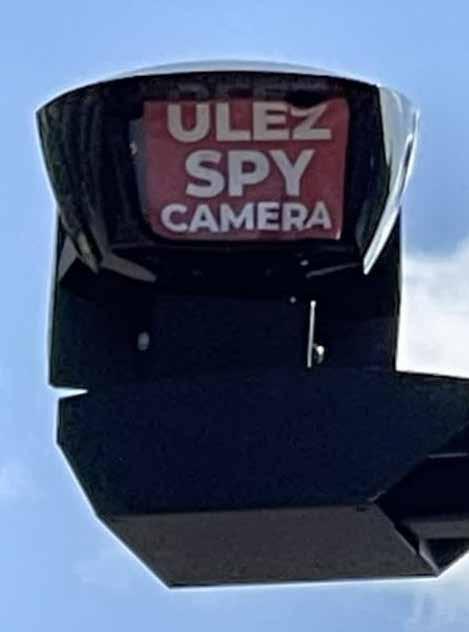
Meanwhile prime minister Rishi Sunak has admitted that he is powerless to overrule Khan on the issue. Legal loopholes have been investigated, but are not available. It was suggested that the Government could block ULEZ expansion under the Greater London Act, if it could be established that it was a policy that contained “inconsistency detrimental to any area outside Greater London”.
While residents of neighbouring boroughs might argue that their lack of access to funding such as scrappage schemes is “detrimental”, the Government’s national environmental policies are not inconsistent with ULEZ – so that idea is in the bin. A Downing Street spokesman said: “We continue to look at options but they are very limited.”
Instead, Tories are calling on Labour leader Keir Starmer to force Khan to abandon the scheme. Starmer has been critical of the plan, especially in the wake of the Uxbridge result, and has encouraged Khan to “reflect” on the scheme, but has not voiced outright opposition to the plan.
SEPTEMBER 2023 19 analysis: ulez
analysis: ulez
The Department for Transport said the decision rested with Khan. A DfT spokesman said: “It is for the mayor to justify ULEZ expansion, and at a time when the Government is doing everything it can to support people with the cost of living, the mayor is responsible for explaining whether it is fair to charge those with non-compliant vehicles £12.50 every time they drive in London.”
For private hire drivers, the impact should be minimal – unless you’re driving a Euro 5 diesel. With the newest non-compliant cars now approaching nine years old, the numbers of non-compliant vehicles should be dwindling. TfL estimates around 3,000 additional journeys by taxi and PHV will be made each day, swelling the TfL coffers by £37,500 in charges alone every day and placing an unwelcome burden on drivers.
In London, many PHVs are Toyota Prius, and these all meet at least Euro 4 petrol standards. The hardest hit are likely to be chauffeurs with pre-2014 Saloons or MPVs, which may be reaching the end of their life but are still worth more than the paltry £2,000 scrappage money on offer. And if the vehicles are registered or based outside the London Boroughs, no financial help is available.
Indeed, the biggest burden of the ULEZ expansion is falling on the poorest residents, who cannot afford to upgrade their vehicles. A 2012 Euro 5 diesel car may still be worth more than £2,000, and even with scrappage, they cannot afford the upgrade.
Motorists were encouraged to buy diesels during the early part of the 21st century, citing lower CO2 emissions than petrol equivalents, and thus being less harmful in terms of climate change. Indeed, the Blair and Brown governments redrafted the VED structure around CO2 emissions, giving diesels an advantage. And in yet another level of irony, Sadiq Khan himself served as a transport minister under Gordon Browm.
For all the bluster about the ULEZ expansion, early indications are that most motorists are complying with the new
restrictions. Data collected in March 2023 relating to the previous boundary of the ULEZ zone (North and South Circular roads) showed a 95.3% compliance rate for all vehicles and 96.6% compliance for cars.


Nevertheless, this equates to a daily average of 25,727 drivers having to pay the £12.50 daily charge, while every day 3,922 £180 penalty fines were issued – a daily total of £321,587 in charges and £70,596 in fines – annual revenue in excess of £20 million.
TfL modelling suggests the number of non-compliant vehicles either driving within the outer boroughs or entering the outer boroughs from outside Greater London will be much higher.
Data from 2022 suggests there will be 3.166m journeys within the outer boroughs and a further 599,000 from outside the expanded zone.
Of these 3.75m journeys, it is suggested that 73,000 would be non-compliant. Using a similar model of charges paid and fines, the ULEZ expansion could generate around
£787,000 per day in charges and a whopping £1.8m a day in fines. That would equate to more than £900m a year, largely paid by poorer people with older vehicles.
Khan’s protestations that ULEZ is not a money-making scheme look somewhat weak when confronted with this data –commissioned by TfL itself.
But for now, Khan is standing firm. The big test will come next May, when he has to stand for re-election as London Mayor.
His Conservative rival, London Assembly member Susan Hall, has vowed to reverse the ULEZ expansion and instead invest £50m into local pollution-reducing schemes.
The issue is bound to rumble on – and with the issue becoming national news in the run-up to a General Election, due before December 2024, it may be that Labour applies pressure on Khan to wind back the decision, as Uxbridge showed it to be a proven vote-loser.
The anger shows no sign of subsiding, and the issue is far from over.

SEPTEMBER 2023 20
CONTINUED FROM PAGE 19
“Indeed, the biggest burden of the ULEZ expansion is falling on the poorest residents, who cannot afford to upgrade their vehicles...”
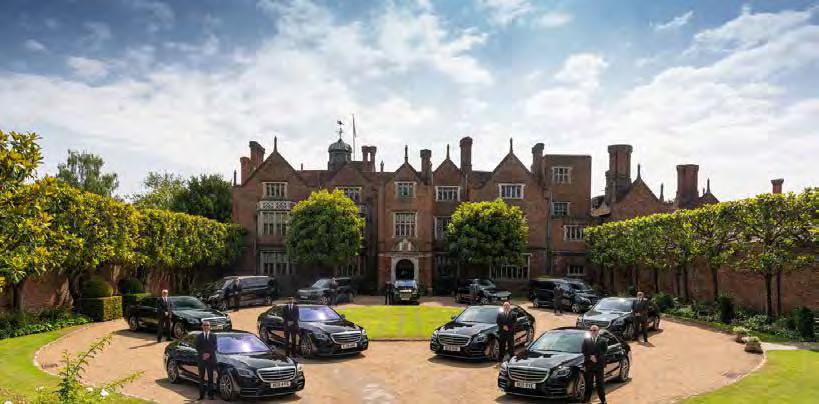


To apply, please email our Operations Manager, John Bagshaw at info@belgravesoflondon.com and attach a copy of your CV. For further information please call 020 3355 3333 or visit belgravesoflondon.com/careers 4x Company car chauffeurs (must be TFL licenced) 2x Day controllers We currently have oportunities for: In addition, we have oportunities for S-Class, VClass and Range Rover owner drivers. Come and join the team New high end luxury vehicles No rental fees Full training and career development opportunities Excellent rates of pay Bonus scheme
Car of the Year Awards 2023

What a day!





CAR OF THE YEAR 2023
Phenomenal turnout for 2023 judging day
We got our wish at this year’s Car of the Year judging day. Every car out on test, all day long, with a record turnout of industry judges having a great time driving more than 40 of the best new cars on the market.

A massive thank you to everyone who came to sunny Epsom Racecourse last month. Now we have the task of analysing the score sheets and choosing our winning cars in each of the six categories.


We’ll announce the winners in each of the six categories – Chauffeur Car, Executive Car, Electric Private Hire Vehicle, Hybrid Private Hire Vehicle, Luxury SUV and MPV – at our prestigious QSi Awards at the Hilton Metropole Hotel in Brighton on Tuesday, November 16. And
https://www.prodrivermags.com/car-of-the-year-home/
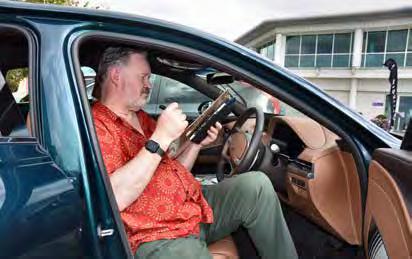
of course, we’ll announce our overall Car of the Year on the night as well.
The QSi Awards are the only awards designed specifically for you, the chauffeur, private hire and taxi operator. We look forward to seeing you there. Entries are open now, so make sure you’re in with a chance of winning. To enter the QSi Awards, or to book a ticket for the QSi Awards dinner, please go to: www.prodrivermags.com/qsi-home
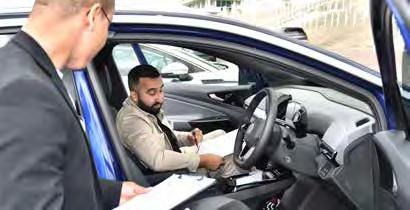
In association with:
https://www.prodrivermags.com/car-of-the-year-home/


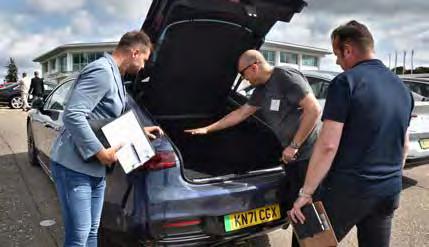

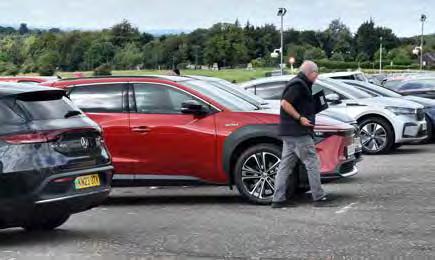


 Meanwhile, here’s a gallery of images, showing our judges sticking to the task of evaluating the best cars.
Meanwhile, here’s a gallery of images, showing our judges sticking to the task of evaluating the best cars.
The third way
Mark Bursa
UBER AND BOLT MAY BE THE BIG NAMES IN RIDE-HAILING, but FreeNow does it differently, UK general manager Mariusz Zabrocki tells Mark Bursa
Think of ride-hailing and Uber immediately springs to mind. But it’s not alone in the fast-growing sector. There’s Bolt, of course, which offers a broadly similar product.
And then there’s FreeNow, which is just a little bit different. The company actually pre-dates Uber, having started in Germany in 2009 as MyTaxi, but only really got going when it was acquired by the technology arms of two of the leading German automakers, BMW and Mercedes-Benz, in 2014.
Its UK launch came through another deal, when MyTaxi bought Hailo, the app that was designed to allow London black cabs to compete with Uber for app-based bookings, but which experienced a rather fraught launch when it tried to add private hire cars to the app – leading to protests and refusals to use Hailo by the black cab trade.
Times have changed since then. MyTaxi was rebranded FreeNow in 2019, as part of a wider initiative on behalf of the two car companies to build a mobility app that encompassed everything from e-scooters and bikes to car sharing to taxis and travel booking.
And yes, that meant private hire as well as taxis in London, achieved without protest this time in April 2020. Again, acquisition was the key, with FreeNow buying Kapten, formerly the French-owned Chauffeur Privé operation, which launched in London in May 2019.
Since then, FreeNow has started expanding throughout the rest of the UK, focusing on major cities such as Edinburgh, Manchester, Brighton and Reading, and focusing on taxi rather than private hire – though that might change in the future.
“Our ambition is to be Europe’s super mobility app,” says FreeNow’s UK general manager Mariusz Zabrocki, “to provide as many mobility options as possible. In the UK we have black cabs PHVs, scooters and bikes, but we want to go beyond that.”
In Germany, FreeNow offers a wide range of services that are bookable
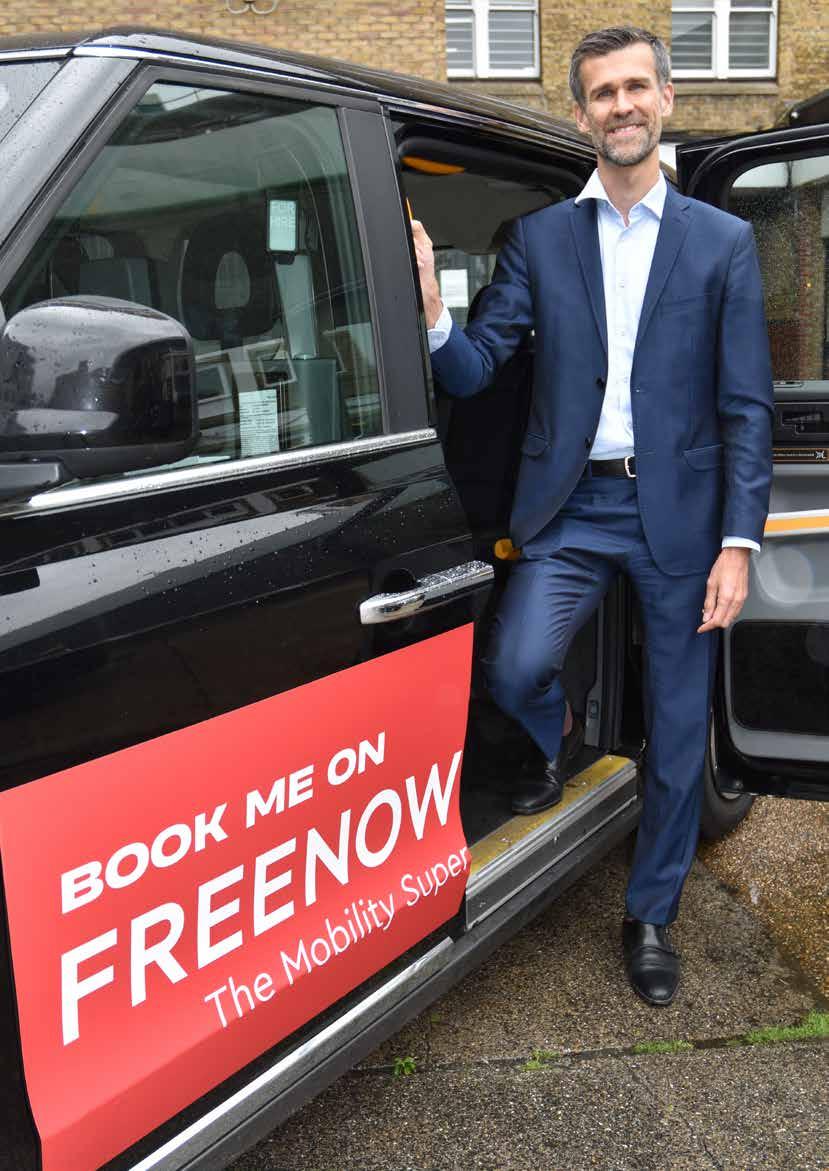
profile: FreeNow 24 SEPTEMBER 2023
via its app, including car sharing, car rental, public transport, trains, trams and buses. “We also have a mobility budget feature which is something quite new in the UK, where you can use one card or app to pay for all kinds of transport services. Users can manage their mobility budget supported by their employers.”
At present, FreeNow is principally known as the black taxi app in London. “For black cabs we’re the number 1 app in London,” says Zabrocki. But although the taxi business is more established, growth is quite limited. “We already have most of the drivers who are open to app usage – more than 90%.”
But with just 15,000 black cabs on London’s streets nowadays – down from 24,000 just a few years ago – private hire represents a more rapid growth opportunity.
It’s a highly competitive market, and many of the London PHV drivers who have signed up to FreeNow are also on Bolt, Uber and other apps. So building driver loyalty is an important job, Zabrocki says.
“We always focus on paying the drivers well compared to our competition. We launched with zero commission, and we have maintained pretty low commissions and high bonuses compared to Uber and Bolt. That was and is our advantage from the drivers’ perspective.”
“However in taxi we’re number 1, but in PH we’re number 3 app, so we’re continuing to grow and invest in the app.” The focus is on maximising earnings, but understanding that PHV drivers may want to work part time, or may only do the job for a couple of years. “Whereas for black cab drivers it’s a career choice,” he says.
Recent high-profile court cases involving Uber in London and Sefton are having a bearing on how FreeNow approaches driver recruitment, though for now it has not followed Uber’s move toward “worker” status – mainly because the FreeNow drivers don’t seem to want it.
“In London, our drivers are currently independent contractors,” Zabrocki says. “It’s something we keep
looking at. As soon as Uber lost the supreme court case and were forced to make the drivers workers, we thought ‘let’s ask the drivers what they want’ – so we held many focus groups.”
The Supreme Court case did clarify the position that black cab drivers were self-employed, independent operators. Taxi drivers are clearly not workers as they can take jobs from the street or ranks, while prices are set by the regulator, not the operator.
“On the taxi side it’s very clear that drivers value their independence a lot,” Zabrocki says. “We asked them if they would like lower commission and the status of independent contractor or higher commission and worker benefits – and there was a huge preference for independence.”
PHV is a bit different, and more complicated, he adds. “There’s a lot of scepticism about worker status,” says Zabrocki. “Most drivers prefer to be independent contractors, but there is quite a substantial minority that prefers worker status.”
“It’s quite a difficult situation as there is no solution that is OK for everybody. So that is definitely something that is evolving.”
At present, FreeNow has avoided the attention of the militant ACDU union, which forced Uber down the worker routes through the courts. Zabrocki says he would prefer to resolve any disputes amicably.
“If there was a huge majority of drivers who wanted worker status we would give it to them. But what we want to do is to make sure we do what drivers prefer – so we keep having focus groups.”
Could it be possible to have both models? “That’s an ongoing conversation. Does everyone have to be one or the other? How do you justify two statuses?” he asks. “But if the job is sufficiently different between two drivers we could have two different statuses.”
Outside London, the Sefton ruling has clarified the view that a customer’s contract is with the operator, not the driver, and Zabrocki is happy with
the outcome. “Overall I would say I’m in favour of principal status for platforms as it gives more protection for passengers and drivers.”
But he’s keen to stress that the Sefton ruling does not mean that the public perception that 20% VAT will now be added to PH fares is correct.
“That is not something that will happen,” Zabrocki says. “If we start adding 20%, prices will increase, which would price out a lot of consumers and that’s a very, very difficult message in a cost of living crisis.”
He says FreeNow has always paid VAT on its commission since the Hailo days. This is the same position that Uber has now adopted since the High Court ruling in 2022, using the ‘tour operator’ VAT rule. “We continue to have the position that we want to pay our taxes. On the other hand we believe the tour operator margin scheme is a valid way of paying taxes and that is what we ought to use.”
The Sefton case could see a review of VAT charges on PH fares. Should PH be zero-rated? “Good point – buses and most ground transport is not VATable,” he says, adding that UK VAT threshold of £85,000 is an anomaly – much higher than most European countries.
If a lower rate, say 5%, was introduced, Zabrocki says FreeNow would charge that to the whole fare. “I think that would give us more confidence, and nobody wants to spend 5 years in court with HMRC. The resources it would consume would be huge.”
Free Now continues to expand outside London, and Zabrocki has followed Uber’s Local Cab initiative with interest. But for now, the focus has been on taxi, rather than PH, though in many places, dual licensing blurs the lines somewhat.
“A lot of FreeNow outside London is purely black cabs, for example Edinburgh, Reading or Manchester. There, we are only working with black cabs, not PH, and we don’t have any PH licences outside London,” he says.
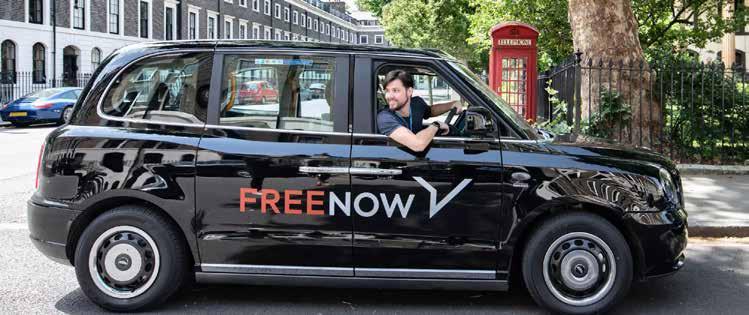
25
SEPTEMBER 2023 profile: FreeNow
CONTINUED ON PAGE 26
profile: FreeNow
CONTINUED FROM PAGE 25
But he admits: “We are definitely looking at something like Local Cab, but the focus is still on London for now. The business is so big – almost half the UK.”
However, providing full national coverage is not an immediate ambition for FreeNow. “Our focus is on bigger cities, not every town. But from big cities we can spread out into surrounding towns.” For example, FreeNow has recently expanded from Brighton to the neighbouring seaside town of Eastbourne.
Like everyone else in the mobility environment, green issues are an important part of the business.
“We have several initiatives,” says Zabrocki. “There are subsidies for drivers looking to upgrade to cleaner vehicles. Almost one third of all our trips are in ZEC vehicles – for taxis the figure is above 40%.
“The subsidies become available to drivers if they hit targets with us. And those with electric vehicles are likely to receive more jobs compared to nonEV taxis, largely because increasing numbers of customers are demanding the greener option.”
FreeNow supports TfL only giving licences to ZEC vehicles. But more needs to be done regarding infrastructure, he says.
“Most drivers don’t have driveways, so the onstreet infrastructure needs to gets better. A lot of drivers live in Whitechapel, but there is not a lot of infrastructure. We need to install chargers near where drivers live. Even TfL data shows that 25% of all demand for charging will be from taxi & PHV.
“Also VAT charged on home charging is at a lower
rate than on-street charging – so more affluent people with driveways pay less VAT,” Zabrocki says. “There are many ways in which PHV and taxi drivers are discriminated against compared to more affluent EV owners, and we really need to focus on sharing the economy in favour of cars that are used 40% of the time, not 4% of the time.”
Concerns around charging prices and availability mean the adoption of EVs is slowing down. For black cabs, the big issue is high vehicle prices and a lack of choice. “The cost of the vehicle is so expensive that a lot of drivers have stuck with the old diesel taxis as long as possible,” Zabrocki says. “Hopefully in a couple of years’ time we will have three models of fully EV black cabs. That is the future I would like to see.”
The cost of cars is an obstacle to driver recruitment for the taxi market, but it’s not the only one. Drivers are still in short supply.
“It’s a huge issue on the taxi side, though not so on PH side. There was a shortage immediately after the pandemic, where demand came back faster than supply. It took some time for supply to come back. But now it’s fine – I would say with PHV we don’t have a supply issue in London, and as I understand it it’s mostly OK throughout the UK.”
“But taxi is different – especially in London and some other cities such as Manchester, we don’t have enough drivers. We could easily have 30-40% more drivers and it would be completely busy.”
The numbers have dwindled alarmingly. There are now just 15,000 vehicle licenses in London black cabs. “Our number one concern is how to bring more taxi drivers to the trade, and to do that we have to
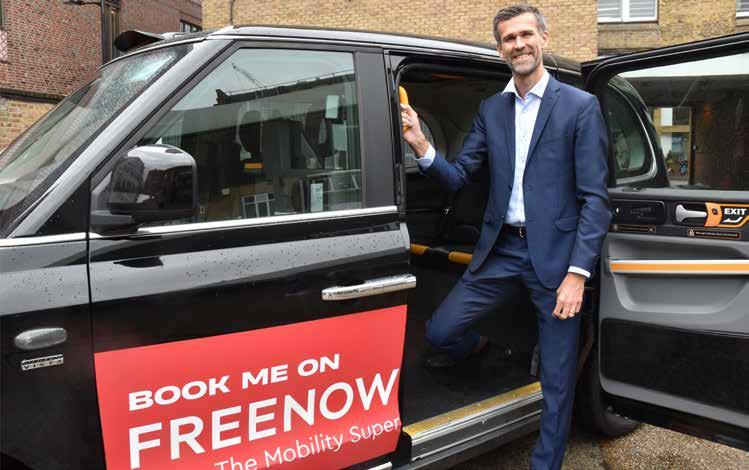
reform the Knowledge and bring it into the 21st century.” Zabrocki believes.
“Currently it’s such a difficult process – it takes 3-4 years to complete, and there’s unpredictability. There’s so much to memorise – it needs to change. We need to focus on safety and quality of service. The number of points and streets to memorise could be massively reduced.”
Currently the Knowledge requires drivers to have detailed knowledge of roads and landmarks in a 6-mile radius around Charing Cross. This could be made smaller, Zabrocki believes. “When we looked at heat map of pick-up points on our app you could reduce that to 3 miles around Green Park – which would be a four times smaller area – but you would still cover 90% of all pick-up points. That would reduce the volume of memorisation massively.”
Of course, drivers also use navigation apps as well as memory, and a combination of the two is the best combination. “I compare it to chess. Computers could beat humans, but a combination of computers and humans could beat the computer on its own,” he adds.
“We should condense the syllabus, and add more certainty, but add additional requirements in terms of customer service. That is more useful than driver memorising hundreds of streets.”
Zabrocki believes these changes could bring a 3-4 year process down to 12 months. “We asked our PHV drivers if they would consider doing the knowledge and becoming a taxi driver. It was very clear that even reducing it even to two years would encourage many of them to become taxi drivers.”
SEPTEMBER 2023 26
Wheels of desire
Paul Webb
Ayear on from its UK debut at the 2022 Professional Driver Car of the Year judging event, the BMW i7 was back at Epsom racecourse.
This time our judges were eagerly queueing up to drive the i7, and I’d finally got my hands on one for a test. Worth the wait? You bet.
I’d been itching to get behind the wheel after seeing the car and reading Mark’s road test earlier this year. And of course, many of the top chauffeur operators have committed to the car, and their positive reaction certainly got my juices flowing.
For companies now operating the i7, such as Chabé and Belgraves, the car has certainly met their expectations, especially for clients who were demanding both fully electric transport and a truly first-class chauffeur car.

The i7 was also my first foray into electric vehicles – I’ve been driving a petrol-engined Mazda 6 for the past year, so my first few days with the BMW was spent reading the manual about what this amazing machine has to offer – and working out where the nearest charge points to my home were situated. This proved to be problematic. There are none at all in the town where I live, and I don’t have a home charger. The next town does have a fast charger, so I had to develop a new routine of finding something to do for the hour or so that it takes to fully charge.
So I’d end up wandering around Halfords or Tesco, or worse, adding inches to my waistline sitting in McDonald’s. So instead I decided I’d just stay
with the car. It’s a good idea - you soon meet other electric car owners and end up spending the charging time discussing each others’ cars. It helps to have something pretty desirable, and showing off the rear seats of the i7 is a great way to win new friends. So how easy is the transition to electric? It takes some getting used to both in driving style and trip planning, but once you get your head round the need
to factor in more time, the stress levels decrease. However, with a shortage of useable infrastructure I can see why many regional chauffeurs are leaning more toward the hybrid BMW 760e rather than the i7. Having the dual fuel option is pretty useful when you have multiple long-range trips, or you’re carrying a demanding client who changes their destination at the last minute.
In terms of customer appeal, BMW has got it very right. Both i7 and 760e have the same interiors, of course, with an amazing blend of technology, luxury and style. Heated, cooled and massaging seats in the back are controlled by little screens mounted on each door. In fact I’d like to have spent more time in the back of the i7, enjoying the opulent leather and cashmere seats, or reclining fully, putting my feet up on the integrated leg rest and staring out of the ‘sky lounge’ panoramic glass sunroof. It’s all very Emirates First Class cabin, and that’s before we even get on to the tech.
The rear screen is BIG! I’m not sure how much use it will get. but having the ability to plug in your smartphone or laptop is likely to go down well with the whole-day hires.
The only change I’d make would be the ability to watch the TV for the driver in the front. This was a feature on some chauffeur cars 10 years ago, so bring it back! On a wait and return it helps to while away the time, and you can’t just be sitting in the back if the client suddenly reappears ahead of schedule.
Other than that, it’s pretty much faultless. Let’s hope the infrastructure investment is made over the next years, so the EV revolution stays on track.
SEPTEMBER 2023
BMW i7 xDrive60 M Sport
BMW i7 xDrive60 M Sport price £125,705 performance powertrain Battery-electric transmission Single-speed auto, AWD battery capacity 101.7kWh power 544hp torque 745Nm 0-62mph 4.7sec max speed 148mph electric range 367-388 miles [wltp] ac charging time 11hr [0-100% at 11kW] dc charging time 34min [10-80% at 195kW] on-board charger 195kW DC co2 emissions 0g/km[wltp] dimensions length 5,391mm width 1,950mm height 1,544mm wheelbase 3,215mm loadspace 500 litres 27 running report
Electric dreams turn to nightmares
ICONFESS TO BE SOMETHING OF A tortured soul in respect of cleaning up our planet, or at least our industry. It appears sensible and measured to stop pumping out noxious gases and particulates and to leave a planet behind us that is cleaner than the one we inherited.
While it seems a popular pastime to blame our generation for the environmental impact of our way of life, I am old enough to remember ‘pea soupers’ in London when you could literally not see a hand in front of your face, and we struggled to get to school. So we are not the only culprits. Happily, that problem has passed, and the big problem now is the unseen poisons and toxins being pushed into the air.
Michael Galvin

points are out of action at any one time – for evidence check the Zap-map app.
Charges are now as high as 85p per kilowatt hour – price gouging at its best! I would also point out that there are less than a million (840k to be precise) EVs in the UK out of 32 million vehicles. All the hype of EV sales going through the roof, as in this extract from a government press release: “Sales of new plug-in vehicles nationally rise by over 70% as UK continues to accelerate towards net-zero transport,” is just part of a cynical campaign of everyone else is doing, so why aren’t you?
Politicians and policy makers appear to love a campaign regardless of the evidence. This headlong rush into electric vehicles was always destined to end in tears.
That’s not a benefit of hindsight. I and many others raised our concerns when changes to licensing vehicles was first ever raised. Will there be enough rapid charge points? Will the price of charging be controlled in some way? And what happens if manufacturers don’t produce a sufficient selection of cars with adequate ranges?
It’ll come out in the wash, was the response. Anyone who persisted with these arguments was branded as negative, or “just finding obstacles”. Well, the wash looks a complete mess to me! Hope and expectation has not equalled experience.
So, what do we do? On one side of the equation, something needs to be done to prevent our grandchildren and great grandchildren living in a swampy green cesspool. On the other hand, we seem ill-prepared to make the transition.
The headlong dash to net zero, or in our case EVs regardless of the practicalities, costs and viability, is frightening. Ebullient politicians appear to compete with each other to bring target dates ever closer with scant, or if we are honest, zero regard for the consequences.
Never have sound bites and press releases been issued with such abandon. Any detractors are treated as heretics, traitors or idiots. In all it is a lost opportunity to achieve a consensual route to the same goal albeit without wrecking the farm on the way.
While I don’t want to re-rehearse all the arguments stacked against the lunacy of the prevailing deadlines, some, I believe, are worth raising for the sake of context.
INSUFFICIENT RAPID CHARGING POINTS
Look at the motorway queues at busy travel spots or talk to the CEO of Moto service stations. Around 25% of charging
It’s way past the time for policymakers to sit down with the industry and have a proper discussion out of which will come a practical plan. Instead, we will see licence shopping explode as more councils jump on the ULEZ/ ZEC bandwagons to “protect our children”.
The councils with the lowest bars will end up with the most licensees. The more responsible, yet perhaps overzealous councils will see their licensed vehicle and driver counts diminish.
That is not something I feel 100% comfortable with. However, at the sharp end, drivers are being asked to invest (a polite term) in a more expensive vehicle, that is difficult to operate due to the charging infrastructure deficit and pay more for fuel than they do now.
If we have problems in this country, and we do with fewer than 1m EVs, what will it be like when we have 5m or 10m? Well, we will soon find out as the sales of new pure ICE vehicles are banned in 2030, with PHEVs available until 2035.
It is disturbing that so many early adopters in this industry have subsequently returned their electric vehicles – too expensive to buy, too difficult to charge and too expensive to fuel. As the government and Bank of England attempt to reduce inflation, will increasing taxi and PH fares help that?
So why can’t we have more chargers as a starting point – planning appears to be the big issue followed by local supply issues. Both are broadly within government and local government influence if not control so why do they sit on their hands?
I am confident that the industry could work with policymakers to smooth the transition, but the alternative of increasing the size of the sticks, combined with a carrot shortage, will just lead to drivers, sensibly in my opinion, getting smarter about what, and when, they purchase vehicles (2029 is going to be a record breaker) and how and where they license their vehicles. Only the planet loses out!
the knowledge
SEPTEMBER 2023 28
Dr
https://mobility serviceslimited .com
How to make a small business work
As the quiet summer months end, many of us find ourselves reflecting on a turbulent year for business, both good and bad.
Amid my discussions about significant industry tax issues, I thought we could take a moment to consider another side of business: the realm of business advice.
With a wealth of experience gained over the years, I want to share some insights that have guided countless clients, both start-ups and established small businesses, on their journey.
Having personally seen businesses rise and fall, thrive and struggle, a seasoned advisor (rather than an old bloke) has a unique perspective to offer. With a deep affection for all my clients, I have had the privilege of collaborating with numerous individuals and companies, and from these interactions, valuable lessons have appeared.

eazitax.co.uk
Venturing into the world of business, particularly in the private hire sector, may seem daunting, but it’s not all doom and gloom. In fact, the recent surge in start-ups within this industry signals a promising shift.
To navigate this landscape effectively, the following four fundamental rules can make all the difference between success and failure for small traders, start-ups, and even larger SME car companies.
EMBRACE A SALES-LED APPROACH
One of the most critical aspects of any business in the early days is cashflow, regardless of its size, which means a robust focus on sales. Rather than getting lost in the minutiae of perfectionism and intricate details, it’s vital to channel your energy into driving revenue.
This perspective challenges the common tendency to procrastinate or obsess over flawless logos and systems. While keeping integrity, prioritise the generation of income that keeps the lights on. Staying open to innovative sales and marketing strategies can lead to growth, as long as you’re willing to ask for the sale and seize opportunities.
PRIORITISE ACTIVITY
In the fast-paced world of entrepreneurship, action is king. The notion that if you were truly committed to something, you’d already be working on it, holds a great deal of truth. Excuses may supply temporary relief, but they won’t propel your business forward. High levels of activity, even if accompanied by mistakes, can accelerate progress. Mistakes offer valuable learning experiences that contribute to eventual
success. The mantra here is clear: don’t just seek shortcuts, focus on consistent and purposeful actions.
STRIVE FOR SMART RESOURCE ALLOCATION
Spending wisely is a hallmark of successful businesses, especially during the early stages. Instead of splurging on extravagant office spaces or unnecessary vanity projects, distribute resources thoughtfully.
The emphasis should be on meeting the needs of clients while keeping overhead costs in check. Scaling too quickly or unnecessarily can lead to financial strain, potentially jeopardizing the viability of your business. In the pursuit of longterm success, choose frugality and prudence over opulence (that’s a big posh office to you, mate).
DELAYED GRATIFICATION AND PRUDENT BORROWING
The allure of instant gratification can often hinder long-term success. I always emphasise the importance of embracing delayed gratification, a quality that distinguishes prosperous individuals and businesses. While dreams of luxury holidays, expensive watches, and prestigious cars may be enticing, diverting funds from crucial development initiatives can impede growth.
True wealth is not defined by material possessions but by sustainable financial health. Instead of borrowing impulsively, adopt a patient mindset and invest in the business’s growth before indulging in personal luxuries.
IN CONCLUSION
The journey of building and sustaining a successful business involves adherence to certain guiding principles. While industry tax concerns are significant, a holistic approach to business, encompassing sales, action, resource allocation, and financial good health through systems is essential. My experiences shed light on the path to prosperity for SMEs (small to medium enterprises) in passenger transport.
As the seasons change, so too does the business landscape. Armed with these timeless insights, aspiring business people can approach their ventures with a renewed sense of purpose. Whether you’re navigating the start-up phase or steering an established business through challenges, these principles offer a compass to navigate the complexities of entrepreneurship.
Ultimately, success is not just about reaching the destination; it’s about embracing the journey and the lessons it brings along the way.
Gary Jacobs
Gary Jacobs runs Eazitax, an accountancy firm specialising in the taxi and private hire business
the advisor
SEPTEMBER 2023 29
Buyer beware on rent-to-buy schemes
Benny was annoyed, very, very annoyed He had been a GMB member for about two years, having rented a three-year-old Toyota Prius under a new type of hire-purchase arrangement. But the HP company had seized the car, without explanation, after asking him to bring it in for an “examination”.
Benny’s purchase was made with one of these new rent-to-buy (RTB) financial arrangements. I had seen these schemes advertised but had not thought any more about them. It appears that they are being heavily pushed by PCO car hire companies to drivers, particularly those whose credit ratings are poor.
Under these arrangements, part of the monthly rental fee goes toward the eventual purchase of the vehicle, which becomes their property at a specific date. Benny told me that when he saw this facility being advertised he was more than happy to use it.
“I worked as an admin officer for a local council for a long time, retiring from that job about four years ago. Although the pension was OK it was not enough so I saw a job delivering passports, which I thought would be a doddle, having coffees and biscuits and listening to Magic on the radio. It was not. I lost 7 kilos in a month and my ankles became painful. So, I thought that this RTB malarkey was just right,” he said.
But it didn’t turn out that way. A fuming Benny continued. “Those so-and-sos have nicked my car, given me no explanation and kept my money. I thought that they were having a laugh, but it looks like they are serious. What can I do, and can you help?”
Not only did this PCO hire-purchase company take back the car without so much as a by-your-leave, they did not provide Benny with an account of how much had been put towards the purchase price. No proper credit and affordability checks had been made to ensure an individual can afford the monthly payments.
More importantly, such schemes may, if you are a hirer, fall outside the scope of the Financial Conduct Authority (FCA), whose rules state that “firms and individuals offering, promoting or selling financial services or products in the UK have to be authorised or registered by us”.
Benny said that following about 4-5 minor accidents over 29,000+ miles of driving, he disputed the amount the hire company charged him for the repairs. They supplied him with no information or invoices to justify their charge.

Afterwards, the company removed the insurance cover supplied under the rental agreement. So, Benny obtained his own insurance but his rental fee was not adjusted to reflect this situation.
I found Benny’s story hard to believe. After checking it out I will give the following advice to our members and those in the wider professional drivers’ community.
Firstly, before signing any contract and accepting the credit offered, read it carefully. Compare the flat interest rate the hire company offers with the current annual percentage rate (APR) offered by other companies.
Ask yourself whether you can afford those payments over the period of the RTB. You will also need to consider your regular and average income
against your typical monthly cost of living expenses and all your vehicle running costs. Remember also to check what consumables such as brakes and tyres may cost as well as potential servicing fees.
Please also note the interest rate is often not highlighted in these agreements but is always there in FCA protected agreements.
Often, interest rates are up to 50%. With today’s car finance, the current approximate rate with standard, reputable car sales and loans is around 5-8% as a flat rate. Many RTB companies do not declare that the interest rate for the contract you are signing may be outside the scope of FCA and the Consumer Credit Act.
If you are unsure, a quick internet search will explain the above.
Loans signed outside of the FCA offer no protections to the consumer, such as getting into difficulties with payments through accidents, including non-fault accidents, illness, and lack of income. These contracts can be classed as business contracts and are often outside standard protected agreements.
Should one of these businesses go into administration or bankruptcy, their assets, including the vehicles they own, are assets of the business, not yours, until final payments on the vehicle have been met.
Also, have a look at the cost of the vehicle at other car supermarkets as you may find the equivalent model is cheaper to buy on hire purchase.
Another critical point to consider is that after five years, the typical RTB period, will the vehicle still be viable as a private hire vehicle, when it may have accumulated in excess of 200,000 miles. After such use, will the interior condition of the vehicle make it suitable for private hire work?
If you cannot obtain credit via a bank or similar institution, maybe due to a poor credit record or no credit history, renting a vehicle this way may be the best option – or perhaps the least worst.
I would remind all drivers to photograph the vehicle on collection, including the underside. This could avoid disputes or arguments later on regarding any damage.
Transport for London, the taxi and PHV licensing authority for London, will not allow vehicles older than 10 years to continue to be registered as a PHV. Other licensing authorities may have different requirements.
However, don’t forget many operators will not allow high mileage vehicles on their platforms, so again, this needs to be considered. So you will need to carefully estimate the mileage that will be built up with this vehicle over the rental and beyond.
Before you sign anything always read all the small print and if in doubt send a copy of the unsigned contact to the GMB Professional Drivers Branch to look at or ask a trusted friend or relative first.
We are continuing to negotiate with the RTB company on behalf of Benny, and we’re hopeful we can get his car back.
n Simon Rush, G56 Branch President – www.gmb.org.uk/join
Email: Simon.Rush@gmbactivist.org.uk
the negotiator
Simon Rush
SEPTEMBER 2023 30
The union view from our GMB representative
Keeping the (were)wolf from the door
There is a great scene in the 1981 film ‘American Werewolf in London’. It happens when the two stars stumble into the Slaughtered Lamb pub to seek shelter from the British weather, and the blood-curdling howls of a hungry beast.
The busy boozer stops in freeze frame as the patrons turn and stare toward the strangers, giving them the kind of look reserved for those who break wind at the funeral of a war hero.
Coming out of Covid I was lucky enough to snag two weeks’ work on the production of the Little Mermaid remake. This was literally a life saver for me. I hadn’t worked in eighteen months and was scraping the Bounce Back Loan barrel to exist.
Kevin Willis
Everyday problems from the operator’s point of view...
On my first day I wandered into the drivers’ room to grab a cup of tea, as you do. Already in there were six (established) unit drivers all doing what drivers do best, namely talking bollocks and telling inappropriate jokes. To a man they clammed up and gave me the same look that befell the American tourists in that movie. No one uttered a word until I had made my tea and walked back out. It was surreal.
In time I discovered why I was viewed so differently in the film world. It was because I was viewed as a ‘corporate’ driver and we corporate drivers were infiltrating the closed shop security of the Unit driver world. So I was shunned to face the Werewolf alone.
The issue Unit drivers have with us corporate drivers (I have never referred to myself in this way) is that we were expected to be off like manure-off-a-stick as soon as business and tourism returned. And they were right, primarily because the pay is two times better on the other side and you don’t always have to work the minimum 12-hour shifts they do on-set.
Roll forward a couple of years and with Covid consigned to a distant memory (though I’m still paying back the Bounce Back Loan), and work is busy on the corporate side but, due to a strike by writers and actors across the film industry, it is the turn of unit drivers to be the ones sitting at home.
Sod’s law dictates that the strike starts mere days after the very busy period of the corporate sector starts to slow down from the madness of June and July. The strike is frustrating, as is most industrial action, because we all think “well, they aren’t saving lives” and actors and writers earn a fortune anyway so why should we worry about the creatives when we can’t get satisfaction for junior doctors?
It is safe to assume that Brad Pitt and Scarlet Johannson have sufficient reserves in which to tough out a Californian winter but, the cold facts are, that the film industry employs
thousands of people who don’t face the camera but exist, quite literally, behind the scenes.
Cooks, carpenters, scaffolders and sound techs, make-up artists, painters, brickies and of course drivers. Now I do not know much about whether the strike is justified. Apparently Apple, Netflix and Disney are taking the mickey in what they pay, so “power to the people”.
Being a good northerner I should be a rank and file socialist and tell you all strikes are for the greater good, but I am not. Certainly, we could pay doctors and nurses double and it wouldn’t be enough, but a 35% rise is never going to happen. Our trains need more staff to serve the public, not less, but don’t look me in the eye and tell me you are trying to keep the public disruption to a minimum then cancel trains strategically for maximum disruption.
Our industry suffers from never having had an effective Union voice. We are all too insular for a union to work. If 1,000 members go on strike, 1,000 others see an opportunity to steal their work. The only service provider in the film industry without representation is us drivers.
It matters not what title we decide to work under; taxi, chauffeur, unit driver, executive hire or coach driver because we all serve the same industry in one way or another. An industry that, pretty much gives us all the same problems and issues. Some may wear a suit and tie while others wear jeans and t-shirt, but we are all scrapping to get from A to B with the minimum of fuss and, hopefully, avoiding the worst of the traffic.
With no immediate resolution in sight, I’m asking that we spare a thought for those guys and gals sitting at home worrying about when the next pay cheque will arrive. As we all know from recent events, being stuck at home watching any savings we had bleed out is beyond stressful.
I enjoyed my time in the film world and made lots of good friends and colleagues. Pre-strike, I managed to keep a foot in both unit and corporate driver camps so, where possible, we have been returning the favour by offering jobs to redundant unit drivers while trying to balance a loyalty to our established suppliers.
We won’t, can’t, take it personally when, just as corporate drivers deserted the film sets after covid, the unit drivers do the same as soon as the cameras start rolling again. Fair enough, we stick to what we know and love. In the meantime it is important we stick together and not throw each other to the wolves. No sugar in my tea please!
n Kevin Willis runs Chirton Grange, contact@chirtongrange.co.uk – 07725467263

the insider
SEPTEMBER 2023 31
2023







The 10th Anniversary Professional Driver QSi Awards will take place on Thursday, November 16, 2023


New venue: Hilton Metropole Hotel, Brighton



https://www.prodrivermags.com/qsi-awards-home/

SPECIAL!
SEASIDE













 Mark Bursa
Mark Bursa









































 Meanwhile, here’s a gallery of images, showing our judges sticking to the task of evaluating the best cars.
Meanwhile, here’s a gallery of images, showing our judges sticking to the task of evaluating the best cars.








